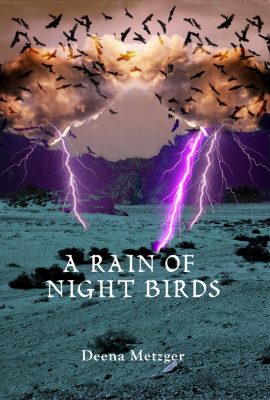Review of A Rain of Night Birds, by Deena Metzger
Author: Mary Fillmore
 To read Deena Metzger’s compelling novel A Rain of Night Birds is to enter the consciousness of two people who take climate chaos and its consequences in deadly earnest. Both are professional climatologists who know the numbers, but they also feel the multiple and irreparable losses personally and deeply. Sandra, the remarkable heroine, was born that way, able to detect earth and solar tremors even as a child. Terrence, the Department Chair who becomes her lover, carries both the scientific knowledge they share, and the particular, ingrained sensibilities and the brokenness of being an Indigenous man.
To read Deena Metzger’s compelling novel A Rain of Night Birds is to enter the consciousness of two people who take climate chaos and its consequences in deadly earnest. Both are professional climatologists who know the numbers, but they also feel the multiple and irreparable losses personally and deeply. Sandra, the remarkable heroine, was born that way, able to detect earth and solar tremors even as a child. Terrence, the Department Chair who becomes her lover, carries both the scientific knowledge they share, and the particular, ingrained sensibilities and the brokenness of being an Indigenous man.
The characters all grapple with the gulf between Indigenous and colonial mind and training. The novel is a complex exploration of an endlessly difficult subject – one that is about to bring the world as we know it to an end. I can’t think of another book which so thoroughly traverses this territory, examining it both intellectually and emotionally through the lives of characters who grip us. We see Sandra struggling with her scientific training and her deep sense of awe and mystery about the world. Her thesis “presented the Native analysis of climate change as cogent, compelling and informative, compared, in her view with the extent of scientific ambiguity, the general unwillingness to take an absolute stand on climate change.” She also wrestles with her own origins as a motherless daughter whose will o’ the wisp mother died in childbirth. When she becomes intimate with Terrence, she is exposed at a much deeper level to the consciousness that both feels the full extent of the earth’s (the ultimate mother’s) agony, and provides some possible ways to hold it.
While any notable feminist writer like Metzger can create a fascinating female character with one hand tied behind her back, the men are some of the most remarkable characters here: John, Sandra’s father, who raises her alone, and Terrence, who becomes her lover. John straddles the world of western medicine and of his learnings from his Native mentor Hosteen – sometimes gracefully, sometimes not. We see him grow in the course of the novel. Terrence is in the uneasy situation of being the head of a hierarchical scientific department, but also carrying a completely different kind of knowing about the world and what is ailing it. The resonances between these characters are a rich part of the novel.
Central, however, is the relationship which develops between Sandra and Terrence. As always, Metzger gives us believable but unusual characters and brings them together in a surprising way. No games, no pretenses from the beginning of the change in their relationship from colleagues (junior/senior) to lovers. It is fascinating to read the tale of people whose primary guidance is through their intuition, which causes them to make unusual choices like living in a tent behind the house to be close to the elements rather than in the house itself. The deep love of the earth which underlies everything else in the novel, including this relationship, shimmers through in glorious passages like “Night had come, the moon had not risen yet, but it was possible by starlight to make out the waves of the hills, slightly darker than the sky.”
Of course the two characters must come to their separate moments of crisis, given the times we live in. Each suffers a Gethsemane of their own, testing their deepest beliefs – and neither can be comforted much by the other in those terrifying times. Each of them ends up in the contradictions of western medicine but as modified and practiced by John. Slowly, they find their way back to each other. While there are no easy answers, the dilemmas posed earlier in the book are set beside the apocalyptic and seemingly inevitable vision of a dead planet. But Metzger offers us so much: credible characters who carry both scientific and Indigenous knowledge about the fate of the earth, a Native consciousness which has something to teach us about how to hold and heal and repair even the wounds of colonialism, and a rendering of the astonishing beauty of the earth and cosmos themselves which will make almost any reader more motivated to save it. Don’t miss the chance to be disturbed and inspired by this stunning book.
Mary Dingee Fillmore is the author of An Address in Amsterdam, an historical novel about a young Jewish woman who joins the anti-Nazi resistance. A Kirkus Indie Book of the Month, the novel was recently awarded the Sarton Women’s Book Award for Historical Fiction.